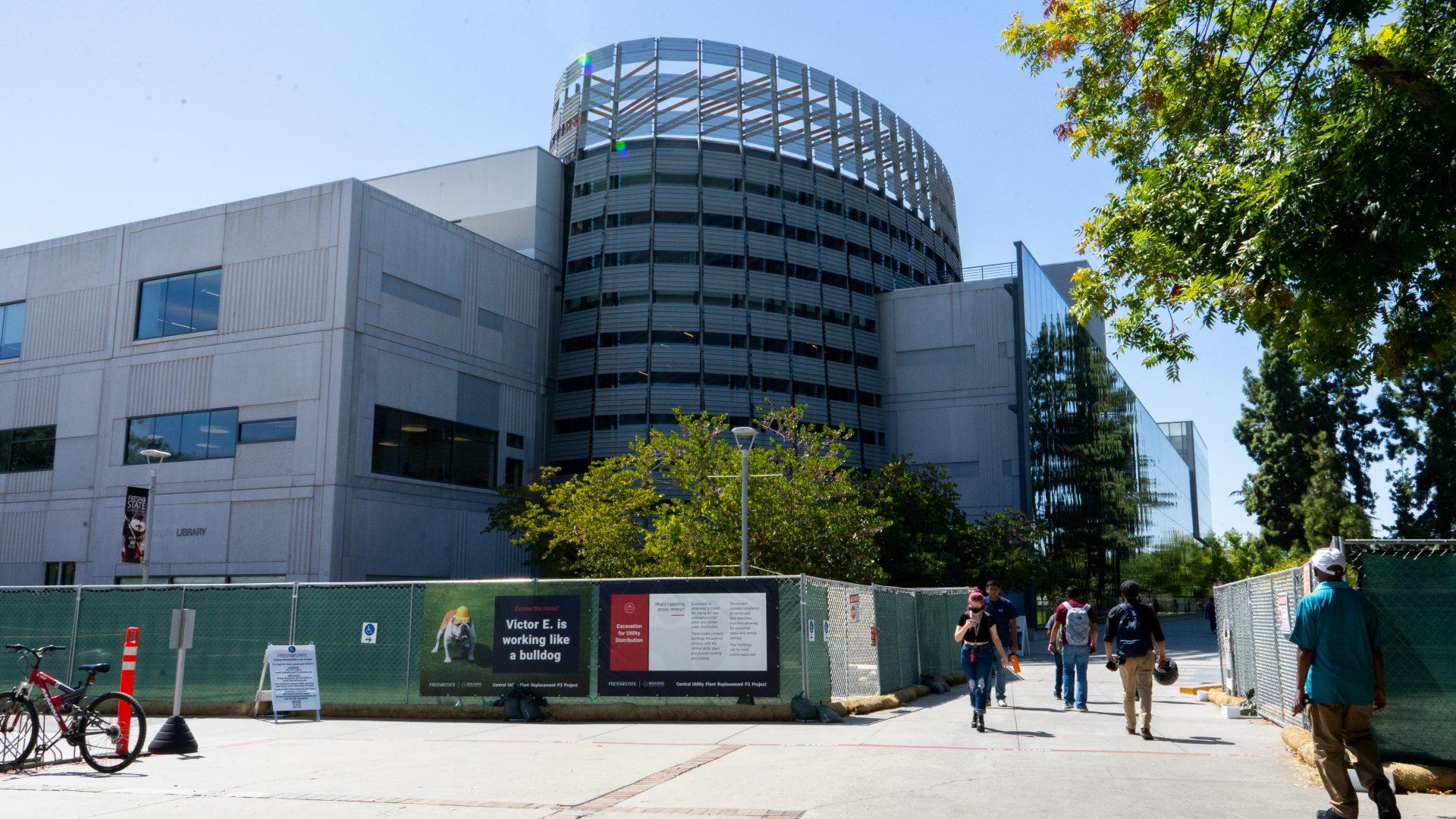Students, staff and faculty have had to readjust navigating campus this semester due to the construction being done throughout Fresno State. Large areas of fencing constrict walking pathways on campus, and adjustments to HVAC and lighting will affect multiple classrooms.
This is due to the multiyear and multi-million dollar Central Utility Plant Replacement (CUPR) Project that began in May.
“The project itself is replacing and stabilizing our 60-year-old infrastructure on how we provide air conditioning or temperature controls in our buildings. Our campus is 60 years old, our buildings are 60 years old [and] our infrastructure is 60 years old,” said Tinnah Medina, the head of University Facilities Management.
The project has collided this week with a record heat wave in California, with Fresno expecting temperatures as high as 112 degrees on Tuesday.
University Communications sent out a campus-wide email on Aug. 29 noting that HVAC upgrades to temperature controls are impacting campus’ ability to address “ temperature fluctuations,” leading to “uncomfortable building conditions.”
On Tuesday morning, Fresno State President Saúl Jiménez-Sandoval also released a campus-wide email announcing “an excessive heat warning” from today through Friday, Sept. 9, according to the National Weather Services.
Some professors on Monday evening canceled classes or shifted them to online instruction due to the heat. Fresno State faculty, staff and students shared their concerns and complaints regarding the temperature on campus.
“It’s so distracting, honestly. You can’t really go too long without thinking about how hot it is in here. I remember even from the first day of class I walked in and I was like, what is going on with the heat?” Fresno State student Grace Yang said.
According to Yang, temperatures have been recorded as high as 90 degrees in her classes in the Food Science Building.
Criminology professor Chadley Jones decided to end one class session because of the current conditions.
“I started to just feel pretty overwhelmed with what was going on and having shortness of breath and started sweating a lot more. So I think it was at about 35 minutes I said, ‘OK, I don’t think it’s safe for us to be here anymore,’ and sent the class home,” Jones said.
Facilities Management will monitor the indoor temperatures of campus buildings and classrooms, and outdoor activities occurring after 10 a.m. could be moved indoors, according to Jiménez-Sandoval in the email.
“Instructors may also choose an alternative modality for instruction due to possible warmer indoor room temperatures caused by the chilled water capacity (HVAC) at our Central Utility Plant… Please stay well-hydrated this week as exposure to extreme heat may result in heat stroke and heat exhaustion,” Jiménez-Sandoval said.
The CUPR Project intends to make Fresno State, which is currently the largest PG&E consumer in the Central Valley, more energy efficient and independent, Medina said.
The project will provide more than 30% energy savings to the campus and serve over 25,000 students, faculty and staff through efficient and reliable heating and cooling, according to the CUPR Project’s website.
Despite the benefits, some students and staff are still frustrated with the fencing and construction caused by the CUPR Project.
Currently fencing impacts access to the Thomas Building, Professional Human Services, McKee Fisk and the Library’s east employee entrance. With construction occurring in areas that experience heavy foot traffic, navigating campus has become more difficult.
“I feel like it’s difficult because people don’t know how to get around them. It’s making it so now I can’t get to class as fast because people are confused trying to figure out where they are at,” said Fresno State student Josefina Cervantes.
Cervantes said that it now takes her “twice as long” to go from one class to another because of the fencing.
Multiple buildings on campus will be impacted by other aspects of construction beside fencing, however. Buildings such as McKee Fisk, Family Food Science, Engineering East, Engineering West have been experiencing air conditioning issues since the start of the semester due to the CUPR Project.
To address temperature struggles within classrooms, Facilities Management has hired a local mechanical contractor to provide temporary cooling through chillers on semi-trucks, according to an Aug. 29 email. The email said the measures will “be in place as soon as possible.”
However, the fencing will remain until the end of 2022, according to Medina, with overall construction not scheduled to be completed until 2024.




